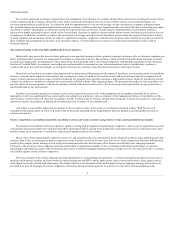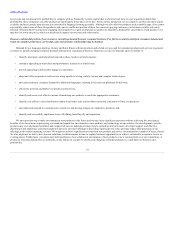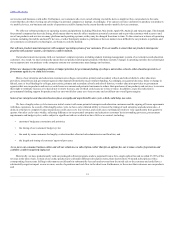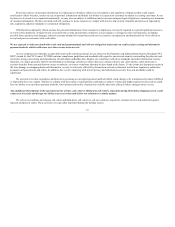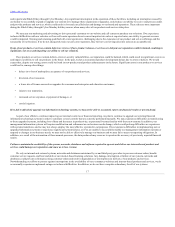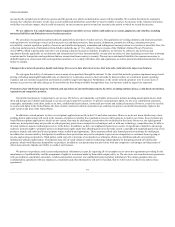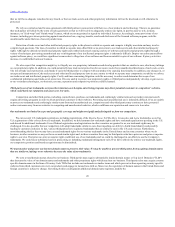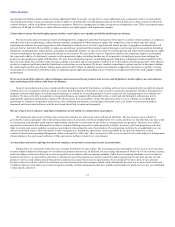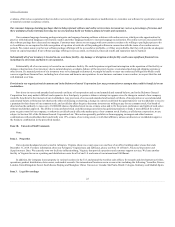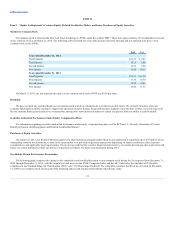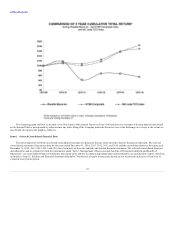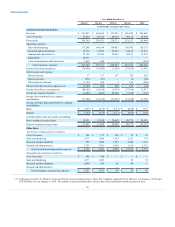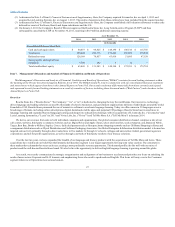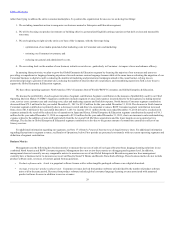Rosetta Stone 2014 Annual Report Download - page 20
Download and view the complete annual report
Please find page 20 of the 2014 Rosetta Stone annual report below. You can navigate through the pages in the report by either clicking on the pages listed below, or by using the keyword search tool below to find specific information within the annual report.
Table of Contents
In the event of an interruption or system event we may be unable to meet contract service level requirements, or we could experience an unrecoverable loss of
data which could cause us to lose customers and could harm our reputation and cause us to face unexpected liabilities and expenses. If we continue to expand
our business, we will put additional strains on these systems. As we continue to move additional product features to online systems or place more of our
business online, all of these considerations will become more significant.
We may also need to grow, reconfigure or relocate our data centers in response to changing business needs, which may be costly and lead to unplanned
disruptions of service.
We may incur losses associated with currency fluctuations and may not be able to effectively hedge our exposure, which could impair our financial
performance.
Our operating results are subject to fluctuations in foreign currency exchange rates. We currently do not attempt to mitigate a portion of these risks
through foreign currency hedging, based on our judgment of the appropriate trade-offs among risk, opportunity and expense. In the future, we might choose
to engage in foreign currency hedging transactions, which would involve different risks and uncertainties.
Our revolving credit facility contains covenants which may adversely impact our business and the failure to comply with such covenants could cause any
outstanding debt to become immediately payable.
Our revolving credit facility contains financial covenants currently applicable to us, as well as a number of restrictive covenants, including restrictions
on incurring additional debt, making investments and other restricted payments, selling assets, paying dividends and redeeming or repurchasing capital stock
and debt, subject to certain exceptions. Our $25 million revolving credit facility requires us to maintain a minimum Adjusted EBITDA and quick ratio during
its term. Collectively, these covenants could constrain our ability to grow our business through acquisition or engage in other transactions. If we are not able
to comply with all of these covenants, for any reason, some or all of any outstanding debt could become immediately due and payable which could have a
material adverse effect on our liquidity and ability to conduct our business.
If our goodwill or indefinite-lived intangible assets become impaired, we may be required to record a significant charge to earnings.
Under GAAP, we review our goodwill and indefinite lived intangible assets for impairment at least annually and when there are changes in
circumstances. Factors that may be considered a change in circumstances include a decline in stock price and market capitalization, future cash flows and
slower growth rates in our industry. In the first quarter of 2014, we recorded a goodwill impairment loss of $2.2 million, which represents a full impairment of
the ROW Consumer reporting unit’s goodwill and in the fourth quarter of 2014, we recorded a goodwill impairment loss of $18.0 million, which represents a
full impairment of the North America Consumer Language reporting unit's goodwill. We may be required to record additional significant charges to earnings
in our financial statements during the period in which any impairment of our goodwill or indefinite lived intangible assets is determined, resulting in a
negative effect on our results of operations.
We may have exposure to greater than anticipated tax liabilities.
We are subject to income and indirect tax in the U.S. and many foreign jurisdictions. Significant judgment is required in determining our worldwide
provision for income and indirect taxes. In the ordinary course of our business, there are many transactions and calculations where the ultimate tax
determination is uncertain. The application of indirect taxes (such as sales and use tax, value-added tax (VAT), goods and services tax, business tax and gross
receipt tax) to our businesses and to our users is complex, uncertain and evolving, in part because many of the fundamental statutes and regulations that
impose indirect taxes were established before the adoption and growth of the internet and e-commerce. We are subject to audit by multiple tax authorities
throughout the world. Although we believe our tax estimates are reasonable, the final determination of tax audits and any related litigation could be
materially different from our historical tax provisions and accruals. The results of an audit or litigation could have a material effect on our financial
statements in the period or periods for which that determination is made. Further, any changes to the U.S. or any foreign jurisdictions’ tax laws, tax rates, or
the interpretation of such tax laws, including the Base Erosion Profit Shifting (“BEPS”) project being conducted by the Organization for Economic Co-
operation and Development (“OECD”) could significantly impact how U.S. multinational corporations are taxed. Although we cannot predict whether or in
what form any legislation changes may pass, if enacted it could have a material adverse impact on our tax expense, deferred tax assets and cash flows.
Our deferred tax assets may not be fully realizable.
At December 31, 2014, we had gross deferred tax assets of $61.1 million which was offset by a valuation allowance of $53.8 million for certain
jurisdictions. We recorded the valuation allowance to reflect uncertainties about whether we will be able to realize some of our deferred tax assets before they
expire. The valuation allowance is based on our estimates of taxable
18


